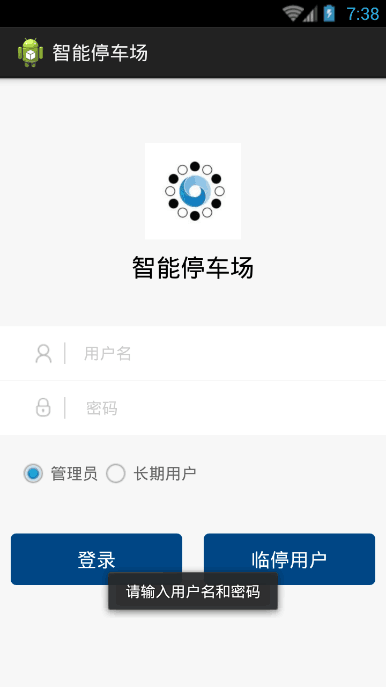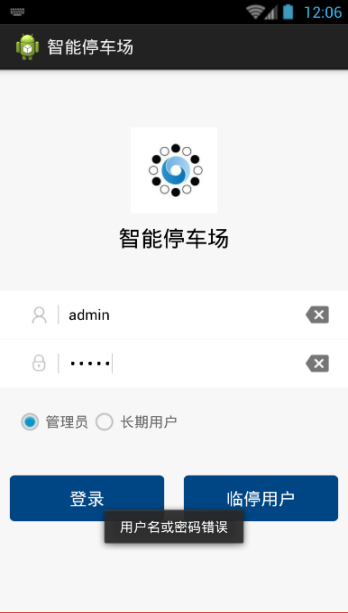基于Android的智能停车场管理系统的测试与管理毕业论文
2020-07-07 21:34:18
摘 要
在当前社会经济飞速发展的背景下,私家车出行成为了人们越来越倾向选择的方式,但随着出行车辆的增多,停车难的问题也不断凸显。智能手机的出现和普及使得利用移动设备对停车场进行系统化智能管理变得简单且迫切。
本研究课题开发设计的智能停车场管理系统基于Android移动端,能够实现停车场管理员对于停车场的智能化管理,更好地指引车辆停放。本文主要研究的是软件的测试和版本管理。通过编写单元测试用例对系统的性能、安全性、界面外观等进行测试,提供测试文档和报告得出测试结论。
本文的行文分为三块。先是对智能停车场管理系统开发的背景、需求和前景进行分析。详细说明在当前的时代背景下开发这款手机应用的效果。其次,对于软件测试进行详细的介绍。依据等价类划分、边界值法和错误推测法等方法,编写特定的单元测试用例,设定各种场景,编写测试表格。最后,涉及版本管理方面的内容,对利用Subversion管理版本进行了一些介绍。
关键词:智能停车场 软件测试 SVN版本管理
Testing and Management of Intelligent Parking Management System Based on Android
Abstract
Under the background of the rapid socio-economic development, private car travel has become an increasingly popular choice. With the number of private car growing, the difficulty of parking is constantly highlighted. The emergence and popularity of smart phones makes it simple and urgent to use mobile devices to systematically and intelligently manage parking lots.
This research project researches and develops the intelligent parking management system based on the Android mobile terminal, enabling the car park administrator to manage the parking lot intelligently and guide vehicle parking better. This article focuses on software testing and version management. It tests the system’s performance, security, and interface appearance by designing unit test cases, and provides test documents and reports to draw test conclusions.
This passage is divided into three sections. First, analyze the background, requirements and prospects of the development of intelligent parking management system. Describe the effect of developing this smart phone application in the current era. Then, provide a detailed introduction to software testing. Write specific unit test cases, set various scenarios, and write test forms based on equivalence classes, boundary value methods, and error estimation methods. Finally, it covers version management aspects and gives some introduction to using Subversion management versions.
Key words: intelligent parking software test SVN
目 录
摘要 …………………………………………………………………………………I
ABSTRACT ………………………………………………………………………II
第一章 引言 ………………………………………………………………………1
1.1 课题背景……………………………………………………………………1
1.2 现实状况……………………………………………………………………2
1.3 市场需求……………………………………………………………………2
1.4 研究价值……………………………………………………………………3
1.5 主要工作……………………………………………………………………3
1.6 论文架构……………………………………………………………………3
第二章 软件测试 ……………………………………………………………… 4
2.1 软件测试概述………………………………………………………………4
2.2 测试工具……………………………………………………………………4
2.2.1 Selenium………………………………………………………………4
2.2.2 DBMonster……………………………………………………………4
2.3 软件测试方法………………………………………………………………5
2.3.1 手动测试 ……………………………………………………………5
2.3.2 自动化测试 …………………………………………………………5
2.3.3 白盒测试 ……………………………………………………………5
2.3.4 黑盒测试 ……………………………………………………………6
2.3.5 三步法 ………………………………………………………………6
2.4 软件测试流程………………………………………………………………7
2.5 软件测试意义………………………………………………………………7
第三章 测试设计……………………………………………………………… 9
3.1 测试内容……………………………………………………………………9
3.1.1 UI测试 ……………………………………………………………9
3.1.2 功能测试……………………………………………………………10
3.1.3 安全测试……………………………………………………………13
3.1.4 性能测试……………………………………………………………13
3.1.5 兼容测试……………………………………………………………14
3.1.6 冲突测试……………………………………………………………15
3.1.7 安装、卸载测试……………………………………………………15
3.2 测试用例…………………………………………………………………16
3.2.1 管理员登录模块……………………………………………………16
3.2.2 用户信息管理模块…………………………………………………17
3.2.3 财务统计模块………………………………………………………17
3.2.4 用户登录模块………………………………………………………18
3.2.5 临时用户注册模块…………………………………………………18
3.2.6 车辆出库、入库模块………………………………………………19
3.2.7 缴费、充值模块……………………………………………………19
3.2.8 导航模块……………………………………………………………20
3.2.9 安全测试用例………………………………………………………20
3.2.10 性能测试用例 ……………………………………………………20
3.2.11 兼容测试用例 ……………………………………………………21
3.2.12 冲突测试用例 ……………………………………………………21
3.2.13 安装、卸载测试用例 ……………………………………………22
第四章 测试结果 …………………………………………………………… 23
4.1 管理员登录模块…………………………………………………………23
4.2 用户信息管理模块………………………………………………………23 4.3 财务统计模块……………………………………………………………25
4.4 用户登录模块……………………………………………………………25
4.5 临时用户注册模块………………………………………………………26 4.6 车辆出库、入库模块……………………………………………………27
4.7 缴费、充值模块…………………………………………………………28
4.8导航模块…………………………………………………………………28 4.9 安全测试模块…………………………………………………………29
4.10 性能测试模块 …………………………………………………………29
4.11 兼容测试模块 …………………………………………………………29 4.12 冲突测试模块 …………………………………………………………29
4.13 安装、卸载测试模块 …………………………………………………30
4.14 测试结论 ………………………………………………………………30
第五章 SVN版本管理 ……………………………………………………… 31
5.1 版本管理概述 …………………………………………………………31
5.2 SVN概述 ………………………………………………………………31 5.3 SVN服务器搭建 ………………………………………………………31
第六章 结语…………………………………………………………………… 35
参考文献…………………………………………………………………………36
致谢……………………………………………………………………………… 37
第一章 引言
1.1 课题背景
在智能手机走进大众生活的今天,管理方式早就不局限于手动记录和电脑查询,因为移动端的快捷方便的特性,越来越多的管理程序设计偏向于移动端,这也引发了对于智能停车场管理设备的新的思考和新的设计思路。本课题就是在基于移动端的设计基础上,思考如何利用手机APP对停车场进行智能高效的管理。
Google公司在2008年耗费了很多精力成功开发了Android智能手机平台。随着人们对智能手机的需求日新月异,以及近年来各种智能软件在移动设备端的出现,为满足人们的需求和软件的适用,Android也在不断发展,最重大的改进就在于设备的造价有着不断降低的趋势。成熟而稳定的Android正在成为智能手机软件开发的首选平台。
Android系统自开发成功以来,就有着无可比拟的平台优势,最显著的就是开放性,兼容性和Google功能。平台的开放性意味着开放的源代码,任何手机系统都可以进入Android平台,任何懂得Android编程语言的开发者都可以进行产品开发和对原有程序的改进,便捷地加上自己的需求,实现新的功能。其开源的特性吸引众多开发者不断创新,他们不断在平台中上线更加完善的产品又反过来为Android平台带来了大量的人气和收益。其次是平台的兼容性,目前的市场软件需求变化很多,但Android平台很完美地解决了数据同步和软硬件兼容等问题。最后是Google应用功能能否无缝接入平台的问题。由于Android于2005年就被谷歌公司收购注资,所以在Android平台面对各种Google应用,能把各项功能渗入到互联网当中去,真正实现将用户接入互联网。在本课题中也涉及到导航车辆的问题,开发过程中使用程序连接到地图API,从开发和实现上都降低了难度和成本,提高了开发效率。短短的三年时间,Android能够迅速成长为移动终端平台的巨头,Android平台本身的特性起到了决定性作用[1]。
相关图片展示:











